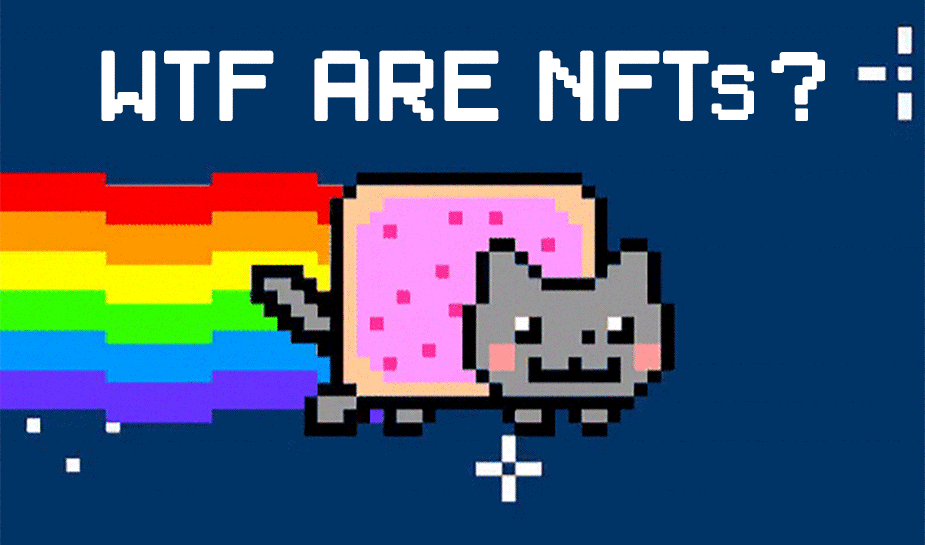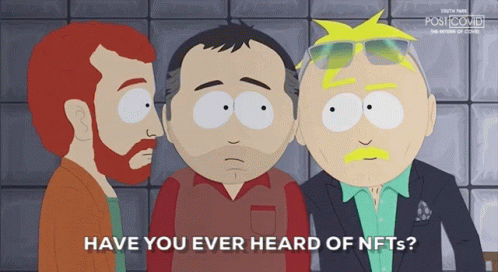NFTs, or Non-Fungible Tokens, are unique cryptographic tokens on a blockchain and cannot be replicated. These tokens represent ownership of digital or real-world items. Unlike cryptocurrencies like Bitcoin or Ethereum, which are fungible and interchangeable, NFTs are indivisible and have distinct characteristics that make them one-of-a-kind. NFTs have gained prominence for providing verifiable ownership and scarcity in the digital realm, particularly in digital art and collectibles. This uniqueness is established through blockchain technology, ensuring the authenticity and provenance of the associated item.

Understanding NFTs in 2024 is crucial for several reasons. For instance, NFTs have the potential to reshape various industries beyond art, including gaming, music, sports, and even real estate. As these tokens gain broader adoption, individuals and businesses need to comprehend their implications for ownership, copyright, and the monetization of digital assets.
Read more: What are dynamic NFTs? Use cases and examples
Also, NFTs are not just a trend but a fundamental innovation in the blockchain space, paving the way for new business models and economic opportunities. To stay competitive and relevant in a rapidly evolving digital landscape, individuals and organizations must grasp the intricacies of NFTs. As the NFT ecosystem continues to mature, it’s vital to navigate potential regulatory developments, taxation, and ethical considerations associated with this technology. In 2024, a solid understanding of NFTs is essential to harness their full potential and mitigate associated risks. In this NFT explainer article, we discuss issues around NFTs and what to expect for NFTs in the future.

NFTs in 2024: Why They Matter
Ah, Non-Fungible Tokens (NFTs), those little digital certificates that say, “Yes, you own a cat meme that everyone else can still see for free.” As we dive into the dazzling world of NFTs in 2024, you might wonder, “Why on Earth do these things still matter?” Well, my dear skeptics, let’s explore this with a hint of sarcasm and a dash of education.
If you thought NFTs were just about buying pixelated art, think bigger. These blockchain oddities are infiltrating consumer goods, sports, and retail industries. Soon, your morning coffee might come with an NFT receipt, proving your loyalty to caffeine. Expect your favorite athlete’s sweaty jersey to be tokenized because, well, why not?
NFTs in 2024 are like that quirky friend you can’t ignore anymore—they’re here to stay, popping up in unexpected places and changing how we think about ownership. So, whether you’re rolling your eyes or diving headfirst into the NFT rabbit hole, remember that even a sarcastic cat meme can be worth a fortune in this digital age.

In 2024, NFTs are becoming increasingly important for several compelling reasons. They’ve evolved beyond the realm of digital art and collectibles. NFTs are increasingly recognized for their educational potential, opening up new avenues for learning and creativity. Whether virtual classrooms, educational games, or digital textbooks, NFTs are pivotal in reshaping how we acquire knowledge.
NFTs transcend their initial hype, finding applications in education, demonstrating resilience in the market, and offering investment opportunities. They’re not just digital collectibles; they’ve become a force of innovation and change across various sectors.
How to Get Started with NFTs
Getting started with NFTs involves several key steps. You need to decide what type of NFT you want to create, whether digital art, music, virtual real estate, or any other unique digital item. Once you’ve determined your digital content, choose an NFT marketplace like OpenSea, Rarible, or Mintable, where you can mint (create) and sell your NFTs.
So, you’ve decided to dive into the world of NFTs; buckle up because here’s a step-by-step guide on how to get started.

Setting up a Digital Wallet
Start by setting up a digital wallet compatible with the blockchain you plan to use. Popular options include MetaMask, Trust Wallet, and Coinbase Wallet. This wallet will store your NFTs and cryptocurrencies.
Purchasing Your First NFT
Start by browsing NFT marketplaces like OpenSea, Blur, or Nifty Gateway. Then, connect your digital wallet to the marketplace and load it with cryptocurrency (usually Ethereum). Find an NFT you like and place a bid or purchase it outright. Confirm the transaction, and voilà, you own your first NFT.
Read more: How to Monetize Your Digital Art with NFTs. Guide

Steps to Minting NFTs
- Decide on the concept for your NFT, whether digital art, music, videos, or any digital item.
- Select an NFT platform that suits your needs. Ethereum-based platforms like OpenSea are popular, but there are alternatives like Binance Smart Chain for lower fees.
- Connect your digital wallet to the chosen platform.
- Create your NFT by following the platform’s instructions, including uploading your digital item, adding metadata, and setting royalties if you want a cut of future sales.
- Mint the NFT essentially means creating a unique token on the blockchain.

Tips for Successful NFT Sales
Selling NFT is nothing different from selling regular cryptocurrencies. You need to build a community around your NFTs by engaging with your audience on social media and NFT forums. Also, it is vital to price your NFTs competitively, considering factors like rarity, demand, and reputation.
Promoting your NFTs through various channels, including social media, art communities, and NFT marketplaces, is necessary to ensure you broaden your reach and increase community vibrancy, increasing the demand for your NFTs. Finally, it is crucial to remain transparent about your work and consider offering limited editions or perks to early buyers.
Risks and Challenges of NFTs
Navigating the world of NFTs isn’t all rainbows and unicorns; it comes with its fair share of risks and NFT challenges. NFTs offer exciting opportunities but pose challenges like pricing uncertainties, legal complexities, and sustainability issues. Those considering involvement in the NFT space should carefully navigate these challenges to make informed decisions.
- Cybersecurity Threats. NFT platforms can be vulnerable to hacking and phishing attacks. Malicious actors may steal valuable digital assets or personal information, posing a significant NFT risk to users.
- Pseudonymity. While the pseudonymous nature of blockchain offers privacy, it can also be exploited for illicit activities like money laundering, as it’s challenging to trace the source of funds.
- Copyright and Intellectual Property. NFTs often involve digital art or content, leading to concerns about copyright infringement as a legal consideration. Creators must navigate the fine line between ownership and rights to their work.
- Privacy and Data Protection. Collecting and using personal data in NFT transactions may conflict with data protection laws. This raises ethical concerns about user privacy and data security.
- Smart Contract Risks. NFTs rely on smart contracts, which can contain vulnerabilities. Errors in these contracts can result in financial loss or unauthorized transactions, impacting both creators and buyers.
- Environmental Impact. The energy consumption of blockchain networks, such as Ethereum, used for NFTs has raised ethical questions due to their significant carbon footprint.
- Regulation. The regulatory landscape surrounding NFTs is still evolving, leaving legal uncertainties. Compliance with existing and future regulations is challenging for creators and platforms.

NFTs and the Future
Emerging technologies in the NFT space include advancements in blockchain interoperability, allowing NFTs to move beyond Ethereum and operate on multiple blockchains, enhancing their utility and reducing associated energy costs. Additionally, Layer 2 solutions improve scalability and transaction efficiency, making NFTs more accessible to a broader audience. The integration of enhanced smart contracts is enabling the NFT future to have more complex functionalities and automated interactions, broadening their applications.
Regarding long-term prospects, NFTs are poised to play a significant role in various industries, from art and entertainment to gaming and real estate. They offer creators new monetization avenues and provide collectors with unique digital assets. However, challenges persist. Sustainability concerns related to the energy-intensive nature of blockchain networks must be addressed to ensure NFTs’ continued growth. Regulatory scrutiny is also on the horizon, with governments considering rules to manage copyright, taxation, and fraud issues. Moreover, the NFT market’s saturation may pose challenges for artists and creators striving to gain recognition and value for their digital assets.
Let’s Recap
NFTs (Non-Fungible Tokens) have emerged as a transformative force in the digital world, offering unique opportunities for creators, collectors, and investors. They are no longer just digital assets but represent a paradigm shift in ownership and authenticity. As we look ahead to 2024, keeping a few key takeaways in mind is essential. First, NFTs are not just about art and collectibles; they have applications in various industries, from gaming to real estate. Second, the NFT space is evolving rapidly, with emerging technologies enhancing their capabilities and accessibility. While NFTs offer exciting possibilities, they also come with challenges, including environmental concerns and regulatory scrutiny.

More Info:
- How to Monetize Your Digital Art with NFTs. Guide
- Embracing the NFTs: A Journey into Digital Ownership
- Harry Styles’ EVNTZ App: The Future of Concerts?
As we move forward, exploring the world of NFTs in 2024 is essential. Whether you’re an artist looking to monetize your digital creations, a collector seeking unique digital assets, or an investor interested in this innovative space, NFT applications offer a vibrant and dynamic landscape. Stay informed, stay curious, and consider how NFTs can be a part of your digital journey in the coming year. The NFT ecosystem is continuously evolving, and 2024 promises to be an exciting chapter in its growth and development.
Disclaimer: All materials on this site are for informational purposes only. None of the material should be interpreted as investment advice. Please note that despite the nature of much of the material created and hosted on this website, HODL.FM is not a financial reference resource and the opinions of authors and other contributors are their own and should not be taken as financial advice. If you require advice of this sort, HODL.FM strongly recommends contacting a qualified industry professional.
